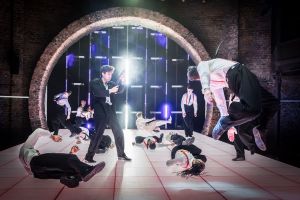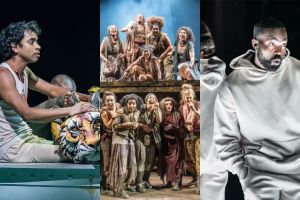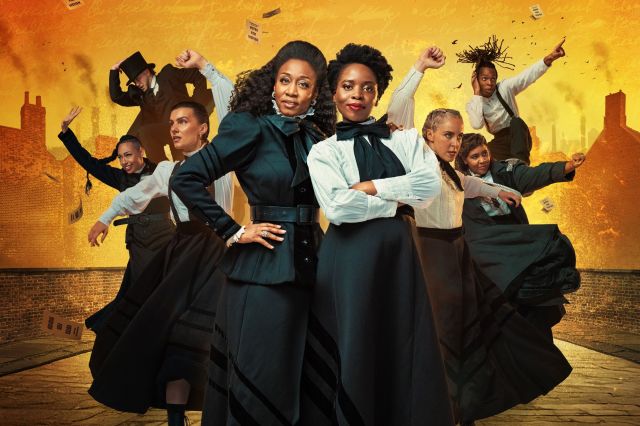Brief Encounter with … designer Tom Scutt
Tom Scutt, last year’s winner of Best Set Designer in the Whatsonstage.com Awards, discusses his forthcoming project for The Royal Opera
Who or what is the biggest theatrical influence in your life?

In all sincerity, Star Wars figures and Lego are mainly to blame. It's all down to the Ewoks' Treehouse really. Aside from that – the theatre ran down one side of my family – my Gran was a performer and could recite whole chunks of Shakespeare to me to the day she died. My Dad taught English and Drama and is not only the originator of my theatre experience but also introduced me to opera at a very early age. I watched theatre with a regularity that was hard to shake as I grew up.
What made you want to pursue a career as a designer?
In my experience of watching theatre when I was younger, I was always drawn to the fact that the design felt like it was the main junction of all the roads of a production. It seemed to be the element that had contact with and ultimately brought together acting, staging, lighting and music. I always enjoyed the idea of opening that umbrella over a production. As well as that, lots of failed attempts at acting helped.
If you had to single out three career-defining moments what would they be and why?
Failing to succeed in making the Blue Peter Tracey Island and finding something exciting about the seemingly awful final result has to be the first moment. Find a fault, make a feature.
Designing Mike Bartlett's 13 on the Olivier stage was possibly my most galvanising experience. It was a production with huge ambitions and scope and whilst the final product had flaws, it was also a great lesson in following your instinct and working intuitively. It also reminded me that the day we complete a project we are 100% happy about is the day we stop working. The joy is in the imperfections.
Third moment? Letting rip on the glitter, colour and magic for four years on the Lyric Hammersmith pantomime. It turns out, dressing grown men as cross-dressing Beefeaters, Laundry Baskets and Cupcakes actually taught me a valuable lesson … because at the end of everything, if we're not entertaining and inspiring younger generations to take up the mantle then what are we doing it for?
How do you approach designing an opera as compared to a play? What are the similarities/differences?
The similarities are probably easier to pin down. They both offer up staging difficulties to solve, you often have reinterpretation/updating problems that you have to make work conceptually, you have a piece of music (or a text) that is the skeleton for all you do and ultimately, you have to house the performers. The differences are many and varied. Timescale is often a big variable. You can find yourself designing an opera a year in advance of the production because the demands are so huge on all departments to realise the design. I can find myself still designing a play in the week of technical rehearsals.
You are also working with something intangible with an opera. The design has to stay true to dynamics and flow, mood and atmosphere as well as using the text as its bible. You have to feel the shape and tone of the score. In a strange way – the emotional journey you discover in the process of designing a play is pretty much intact from the start with opera. It's handed to you by the composer.
You've designed three operas, for three different directors – how does the creative process begin when putting an opera on the stage?
If there's anything I've learnt so far it's that not only does every creative work differently but that no experience is the same. One design process originated from a single moment in the music that unlocks the whole thing, one was born from the requirements and demands of the alternative location it was performed in and one came out of a very clear mission statement between myself and the director to make a 170 year old mythical opera feel human, relevant and cuttingly real. The joy of the design process is that you never know when or how it's going to start and in what form. It's what makes the job ever enticing.
What can audiences expect from How the Whale Became, your fourth operatic adventure?
How The Whale Became is an exception to many of the things I've already mentioned with regards to my experience of opera. As a piece it has been born organically with design, dramaturgy and music working alongside each other throughout. In process and product, we've aimed to break up the traditional set up you'd find in order to make it more accessible. The usual pit in the Linbury studio is populated with audience members and action which will spill into the auditorium and our musicians are as active as the singers. The design start point was to only create things on stage that kids could go home and make for themselves. That roughness and honesty in approach opens up a fertile imagination that allows us to create our own set of rules and continually break them as we go. We continually shift scale and identity in the way children do when they play. Like the animals that are learning to 'be' in the opera, the piece itself is still evolving and 'becoming' in a way I haven't experienced yet in opera and it makes for a beautifully live and immediate experience.
What advice would you give to any budding stage designers who want to follow a career designing for plays and opera?
A degree in Theatre Design is essential to start on the right path. Finding your voice is helped rapidly by making sure you experience as much live art as possible. Meet as many of the creatives you admire as possible and hear what they have to say. The best piece of advice I was ever given however was to stop looking in books on Theatre Design and go outside. Watch and record what's going on out there. Let your designs respond to your world.
What's next on the horizon?
Josie Rourke's production of The Weir which I designed last year is transferring to the West End in January and Roxana Silbert's production of The Life of Galileo originally at the RSC will be touring the country with Birmingham Rep from February.
You're stranded on a desert island but are allowed one musical score – which would you take with you and why?
If it's the music itself, I'd take Eric Satie's Piano Works. If it's the actual score I'd take Die Meistersinger because it's so bloody massive and will probably come in handy to kill small animals. Or burn. Designers – practical.
How the Whale Became previews at The Linbury from 3 December












